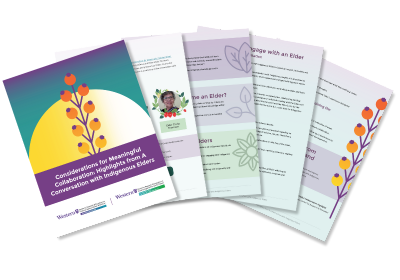Our Work
.
Considerations for Meaningful Collaboration: Highlights from A Conversation with Indigenous Elders

On March 28, 2023, the Learning Network hosted a Special Event on Considerations for Meaningful Collaborations - A Conversation with Indigenous Elders. Elder Norma Jacobs, Elder Naulaq LeDrew and Elder Gloria Thomson were invited to share their own reflections regarding their roles, experiences, and protocols as Elders. Due to the overwhelmingly positive response received to the Special Event, this resource is a summary of the conversation with Elder Norma, Elder Naulaq, and Elder Gloria.
Introducing the Elders
Elder Gae Ho Hwako Norma Jacobs is of the Wolf clan in the Cayuga Nation of the Great Haudenosaunee Confederacy. Gae Ho Hwako is her Ongwehowe name.
Elder Naulaq LeDrew is Inuk and was born and raised in Apex Hill, Nunavut.
Elder Gloria Thomson is Métis with roots in the Northwest Manitoba region.
Who is an Elder?
- The term, Elder, for Indigenous peoples may not have always been the traditional term
Indigenous peoples used. Other terms that may have been and currently are used include
“the old people” or “older people” or “senator” or “knowledge keeper”. - An Elder is generally an older person who has extensive Indigenous knowledge and is
knowledgeable about ceremonies.
How does one become an Elder?
- An Elder is a person who has been invited to become one by their community. Elders are
known community members within Nations who share their traditional knowledge within
the community/territories. - Within Métis nations, an Elder may be voted in by their respective councils to become
a Senator.
Roles of Indigenous Elders
- Provide guidance and understanding on the impacts of colonialism on Indigenous individuals
and peoples. - Reconcile relationships in an inclusive and trusting manner when engaging with Indigenous
and non-Indigenous peoples. - Share Indigenous knowledge, nations history and knowledge about ceremonies.
- Provide Indigenous ways of engagement, such as relationship building and reciprocity with
non-Indigenous and Indigenous peoples about Indigenous issues.
How to engage with an Elder
1. Prior to the invitation
- Understand that engagement with Indigenous Elders is based on respect, inclusivity and
relationship building. - In working towards truth and reconciliation with Indigenous peoples, it is important to
have an awareness of colonial history which suppressed and ignored Indigenous voices
for so long. - Learn more about the treaties of the land from which you are inviting an Elder and learn
about the communities they represent. - Prior to request for Elder participation in events or organization, relationship building
should take place. This can be done by setting up an informal meeting with the Elder well
ahead of the function. At this meeting, describe the event and the Elder’s role for the
event. Also, ask the Elder what they require for the event (i.e., extra time for Indigenous
protocols).
2. Invitation
- After a request is made, allow for time for the Elder to decide.
- At an initial meeting, ask the Elder what their own personal protocol regarding an
agreement to participate is. Example: the offering of tobacco, tea, etc. Note that a
traditional offering is not considered an honorarium. - Ask if they require any assistance or special considerations on the day of the event,
ensuring that comfort levels are respected. - Review agenda with the Elder and ask for their input (e.g., opening ceremony, ongoing
participation, etc).
3. Honoraria
- Honoraria should acknowledge and respect the expertise that an Elder will bring to
the event. This should align with honoraria that would be offered to academic and
professional speakers.
4. During the Event
- Check in with Elders prior to event to ensure that they have what they need (e.g. water,
food, note paper, etc). - Provide space and time for Elders to share their thoughts.
- Build in a debrief time at the end of the event to review Elder’s experience during the
event.
5. Post-Collaboration and Sustaining the Relationship with an Elder
- Offer Elders a gift in appreciation.
- Follow-up to share surveys, audience thoughts on event or evaluation of event.
- Inquire if Elders will be available for and are interested in future collaboration.
- A few days after the event, reconnect with the Elder as a follow up to thank them for
participation and ask if they have any additional thoughts about the experience.
Concluding thoughts from Elders Norma, Naulaq, and Gloria
We would like to take this time to say Nya; Weh, Nakurmiik, Maarsii, thank you and express our gratitude for this opportunity to share our experiences on how to engage with Indigenous Elders. We kindly encourage future collaborations and engagements to continue a learning journey towards peaceful relationships.
Suggested citation: Jacobs, N., Thomson, G., LeDrew, N., Smallboy, L. (2023). Considerations for Meaningful Collaboration: Highlights from a Conversation with Indigenous Elders. Learning Network and Knowledge Hub, Centre for Research & Education on Violence against Women & Children, Western University.





